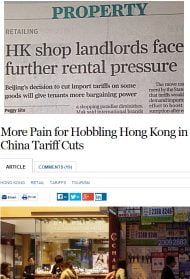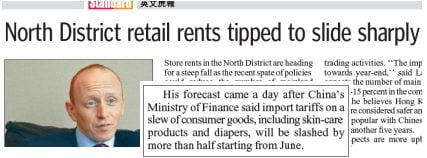Roughly a year ago, I bought a few shares in Belle International, a chain selling ugly shiny shoes for women, and in vaguely cool clothes retailer Bauhaus. They were to be my sacrificial offerings to the Tourism Gods. If Hong Kong enjoyed some relief from its plague of visitors, the value of these investments would fall, I would lose money, and it would be worth every penny – I would kiss the newly vacant sidewalk with gratitude. Conversely, if the deluge of Mainland shoppers continued or even increased, I would profit. My idea of a ‘win-win’.
 Yesterday the market reacted to China’s announcement of tariff cuts on overpriced foreign crappy garbage. Belle was the biggest blue-chip mover of the day, falling 6%. Oh joy! (Just sold it after it bounced back 3% first thing this morning – still made 20% on the wretched thing, as with Bauhaus, which I might keep for the dividend yield.)
Yesterday the market reacted to China’s announcement of tariff cuts on overpriced foreign crappy garbage. Belle was the biggest blue-chip mover of the day, falling 6%. Oh joy! (Just sold it after it bounced back 3% first thing this morning – still made 20% on the wretched thing, as with Bauhaus, which I might keep for the dividend yield.)
The cut in tariffs on things like shoes, cosmetics and diapers looks relatively meaningless, from modest levels of 5-7% to a ‘why bother?’ 2%. But it seems such a slim fall in prices could be enough to keep some Mainland consumers on their side of the border. This will also encourage the trend towards a more efficient parallel-trading system (forget the Chinese name), by which intermediaries order Hong Kong goodies in bulk online for redistribution to local buyers.
Beijing is not doing this for our benefit. Someone up there has woken up to the fact that if they are ever really going to wean themselves off building ghost cities and developing a more consumption-based economy, they might try not driving people offshore to buy things. (Duh.)
But of course to Hong Kong’s landlord-worshipping media and zombie-bureaucrats, a fall in Mainland shoppers is not a ‘benefit’ at all. Anything that might bring rents down is an evil and a curse (after all, lower rents leave more cash in local people’s pockets, and since when have they counted for anything?).
The press call up commercial real-estate agents for their views. A guy at Knight Frank says  rents in North District could come down 10-20% but hopes that Hong Kong products’ reputation for not poisoning people might keep some shoppers coming. The lady at Colliers, wiping the tears from her eyes, concedes that tenants will have more bargaining power. And someone at JLL reckons the locusts will still come here for the ‘shopping experience’ (an issue I thought our young localist groups sought to rectify in Sheung Shui a few months back). A Wall Street Journal headline from a while ago wailed about ‘pain for hobbling Hong Kong’.
rents in North District could come down 10-20% but hopes that Hong Kong products’ reputation for not poisoning people might keep some shoppers coming. The lady at Colliers, wiping the tears from her eyes, concedes that tenants will have more bargaining power. And someone at JLL reckons the locusts will still come here for the ‘shopping experience’ (an issue I thought our young localist groups sought to rectify in Sheung Shui a few months back). A Wall Street Journal headline from a while ago wailed about ‘pain for hobbling Hong Kong’.
The picture with that story shows one of the gold shops whose numbers have expanded maybe five- or ten-fold in recent years next to a shuttered-up property for rent. Monitoring the retail scene in my own neighbourhood – inundated primarily with Koreans – I have noticed a tipping point in recent months. Few if any new stores aimed at outsiders have been opening. A growing number of premises are vacant. And new businesses starting up include a travel agency, a tacky bar, a children-oriented café and a pet-grooming salon; while neither necessary nor welcome, they are at least aimed at local people.
The subject of vacant stores is interesting. A landlord leaving a medium-size street-level space unlet in my district is foregoing maybe HK$1 million a year. In occasional cases, I suspect some sort of family dispute is going on. And as we all know, don’t we, money isn’t everything (my street still has one original, authentic, grimy grocery store selling – or at least offering – faded jars of soy sauce and little else, run by an aging couple apparently oblivious of its 100K-a-month rental value as a cruddy theme-concept restaurant).
The New Yorker notices a similar phenomenon in the West Village, a trendy restaurant etc district near NYC’s own Soho…
…closed storefronts often stay that way, sometimes for years, in an apparent contradiction of the law of supply and demand. If a storefront remains empty for a long time … basic economics suggest that the price being charged is too high. So why doesn’t the owner lower the rents?
In Hong Kong, we assume that it’s because landlords are as cretinously stupid as they are greedy and grasping. In New York, it seems there may be a logic at work: a big financial institution will pay significantly higher rent than a national restaurant or coffee chain, which in turn will pay far more than a local independent café. Rather than sign a lease today with a quirky, charming and fun start-up dining place, landlords will wait for ages in the hope that a big plastic soulless mega-brand tenant will come along.
This is of course a recipe for stripping every neighbourhood of any character and making them all identically bland and tedious. But it also assumes that demand for banks, fast-food and other Big Brand stuff continuously rises. Even in a densely developed place like northern Hong Kong Island, there seems to be a limit to the concentration of branded outlets, with 7-Elevens heading the list at one per 150 yards of street, and Bank of East Asia trailing at one per quarter-mile radius. Many landlords may sit on empty premises in the hope a big brand will come along, but some will be disappointed. Thanks to Beijing’s tariff cuts, maybe many will be. After their first two or three children die of starvation, some might even admit defeat, and rent their stores at reasonable prices to young local entrepreneurs with new ideas.
Or maybe I’m wrong, and everywhere will end up crammed full of bank branches and plasticky restaurant chains. In which case, the tourists will surely drift away out of boredom. Either way, another win-win!


Minor correction but I believe Hong Kong landlords typically starve their children from girls to boys and from last to first.
Tycoon spawn dying of starvation, tourists actually wanting to “tour” instead of shop, and “localness” returning. Win-win-win.
Import duties are almost never the reason for any item being expensive in China, it has more to do with the CCP’s unofficial and therefore hard-to-document trade barriers. The function of these barriers isn’t just protectionism for local industry, but also to allow yet another profitable niches for the princlings and their minions to collect tolls on importers. The tolls usually take the form of exclusive agencies and distributorship for importers with the “local” partner, who can negate the import barriers. The point of the duty cuts was more about sending a message to the markets that consumerism, more disposable diapers in the landfills and waterways, is to be encouraged.
“I’m Gonna Make Him An Offer He Can’t Refuse”
Landlord filth may be down but they’re not out.
Staycations will never grow in China enough for poor dear Hong Kong to notice an ebb in mainland locusts, not until the demand ends for money laundering hot money out of China.
@nimby is absolutely correct. If we all had a free choice then the obvious thing to do is to set up a shop in Shenzhen selling baby milk formula from western distributors – and even put a white face behind the counter to convince people of it’s genuine nature. But of course you would never get the stuff through customs or have a license to trade in the first instance without the pre-requisite amount of kickbacks making it at best an uneconomic proposition or at worst just totally unviable.
Duty reductions are just the window dressing hiding the rotten core.
Is there any way to bundle Joshua Wong into one of those “toxic mortgage” packages and sell him to an investor in another country ? (Preferably the USA)
At what time do retired, reactionary and irrelevant gwailos start hitting the bottle in the late afternoon ?
I can’t speak for Hemlock. For me, it’s when I read a comment like this.